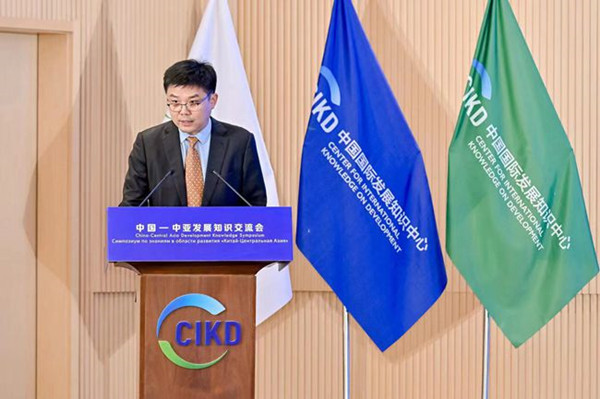- Research
- Research Centers
- Journals
- Admission
- Introduction
- Programs
- Application
- Alumni & Giving
- Alumni Club
- Giving
The China-Central Asia Development Knowledge Symposium, hosted by the Center for International Knowledge on Development, was held in Beijing on July 27, bringing together esteemed government officials from China and Central Asian countries, as well as representatives from universities, think tanks and international organizations.
The event welcomed the participation of Zhao Gang, a member of the standing committee of the CPC committee of Beijing Foreign Studies University (BFSU) and vice-president of the university, who delivered a keynote speech on fostering people-to-people connectivity between China and Central Asian countries.

Zhao Gang, a member of the standing committee of the CPC BFSU committee and vice-president of the university, delivers a keynote speech at the China-Central Asia Development Knowledge Symposium. [Photo/bfsu.edu.cn]
In his address, Zhao emphasized that the development of China's relations with Central Asian countries is deeply interconnected with people-to-people connectivity, which is not only a prerequisite and foundation for various forms of cooperation but also the ultimate goal of regional partnership.
To realize this vision, Zhao highlighted the importance of linguistic understanding, stating that language talent training plays a crucial role in establishing friendly exchanges among the people.
To further strengthen people-to-people bonds between China and the Central Asia, Zhao urged the acceleration of language talent cultivation in China, along with intensified efforts to promote Chinese language teaching in Central Asian nations and the mutual translation of literature and important historical works.
Diverse cultural activities are beneficial to deepening mutual understanding of the history, culture and society among the people of China and Central Asian countries, according to Zhao. This, he believed, would foster greater friendship among the people.
Zhao advocated to recognize the role played by think tanks and press ahead with country and area studies. He also encouraged effective media communication to expand channels to obtain accurate and objective information, as well as the promotion of educational cooperation to further enhance mutual understanding and encourage friendship among the younger generation.